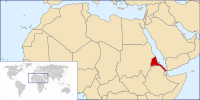The Eritrea Portal
Eritrea (/ˌɛrɪˈtriːə/ ⓘ ERR-ih-TREE-ə or /-ˈtreɪ-/ -TRAY-; Tigrinya: ኤርትራ, romanized: Ertra, pronounced [ʔer(ɨ)trä] ⓘ), officially the State of Eritrea, is a country in the Horn of Africa region of Eastern Africa, with its capital and largest city at Asmara. It is bordered by Ethiopia in the south, Sudan in the west, and Djibouti in the southeast. The northeastern and eastern parts of Eritrea have an extensive coastline along the Red Sea. The nation has a total area of approximately 117,600 km2 (45,406 sq mi), and includes the Dahlak Archipelago and several of the Hanish Islands. Human remains found in Eritrea have been dated to 1 million years old and anthropological research indicates that the area may contain significant records related to the evolution of humans. The Kingdom of Aksum, covering much of modern-day Eritrea and northern Ethiopia, was established during the first or second century AD. It adopted Christianity around the middle of the fourth century. Beginning in the 12th century, the Ethiopian Zagwe and Solomonid dynasties held sway to a fluctuating extent over the entire plateau and the Red Sea coast. Eritrea's central highlands, known as Mereb Melash ("Beyond the Mereb"), were the northern frontier region of the Ethiopian kingdoms and were ruled by a governor titled the Bahr Negash ("lord of the sea"). In the 16th century, the Ottomans conquered the Eritrean coastline. Beginning in 1882–1885, Italian troops systematically spread out from Massawa toward the highland, eventually resulting in the formation of the colony of Italian Eritrea in 1889. After World War II, Eritrea was administered by the British Military Administration until 1952. Following the UN General Assembly decision in 1952, Eritrea would govern itself with a local Eritrean parliament, but for foreign affairs and defense, it would enter into a federal status with Ethiopia for ten years. However, in 1962, the government of Ethiopia annulled the Eritrean parliament and formally annexed Eritrea. The Eritrean secessionist movement organised the Eritrean Liberation Front in 1961 and fought the Eritrean War of Independence until Eritrea gained de facto independence in 1991. Eritrea gained de jure independence in 1993 after an independence referendum. Eritrea is one of the least developed countries. It is a unitary one-party presidential republic in which national legislative and presidential elections have never been held. Isaias Afwerki has served as president since its official independence in 1993. According to Human Rights Watch, the Eritrean government's human rights record is among the worst in the world. The Eritrean government has dismissed these allegations as politically motivated. Freedom of the press in Eritrea is extremely limited; the Press Freedom Index consistently ranks it as one of the least free countries. As of 2022 Reporters Without Borders considers the country to be among those with the least press freedom. Eritrea is a member of the African Union, the United Nations, and the Intergovernmental Authority on Development, and is an observer state in the Arab League alongside Brazil and Venezuela. (Full article...) Selected article -Zersenay Tadese Habtesilase[nb] (Tigrinya: ዘርእሰናይ ታደሰ; born 8 February 1982) is a retired Eritrean long-distance track and road running athlete. He held the men's half marathon world record from 2010 to 2018. His bronze medal in the 10,000 metres at the 2004 Athens Olympics made him the first ever Eritrean Olympic medallist, and his 20-km title at the 2006 IAAF World Road Running Championships also made him the country's first athlete to win at a world championship event. He does not use a sprint finish to win races; his strategy relies on a combination of efficient running and fast pace setting. Zersenay ("Tadese" is his father's name) has found most of his success in the half marathon, with four consecutive victories in the World Half Marathon Championships from 2006 to 2009 (with a 2006 20 km edition), a silver medal in 2010 and a fifth title in 2012. His 5 titles are a record. He set a world record at the Lisbon Half Marathon in 2010. (Full article...)Selected picture - Credit: Optimist on the run
Eritrean Railway, showing mountainous terrain traversed between Arbaroba and Asmara Did you know -
CategoriesRelated portalsWikiProjectsTopics in EritreaSelected panorama -Associated WikimediaThe following Wikimedia Foundation sister projects provide more on this subject:
SourcesDiscover Wikipedia using portals | |||||












































